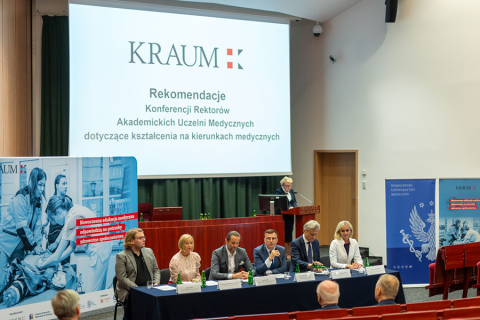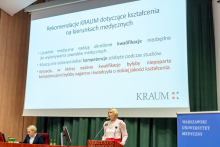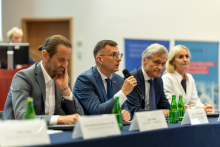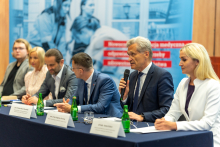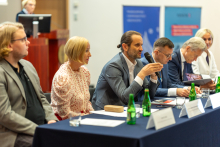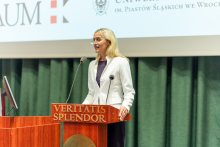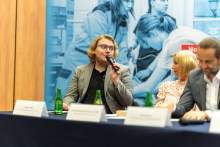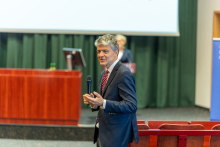Professor Zbigniew Gaciong, Rector of the Medical University of Warsaw (WUM): – What makes the KRAUM recommendations important? Training in a medical faculty is subject to certain procedures and assessment by competent committees. With these recommendations, we intend to assist those who organize training in faculties of medicine in the criteria that should be met in order to ensure an adequate quality of education offered by such faculties. The recommendations may be helpful as they propose certain forms of training that are not exclusively based on statutory syllabuses or requirements.
Presentation of the Recommendations
The document was announced at a press conference held at our School on Friday, June 16. The participants were: prof. Marcin Gruchała, head of KRAUM, Rector of the Gdańsk Medical University (GUMed); prof. Zbigniew Gaciong, Rector of the Medical University of Warsaw (WUM); Piotr Bromber, Vice-Minister of Health, Agnieszka Zimmermann, PhD, School professor, coordinator of the recommendations team, Vice-Rector for Education Quality at GUMed; Anna Kołcz, PhD, Rector’s Representative for Education Quality at the Wrocław Medical University; and Paweł Czudaj, representing the students, representative of the Higher Medical Education Committee, from the Poznan University of Medical Sciences.
– The recommendations were produced by 16 universities associated in KRAUM, with their dozens of years of experience in teaching medical professions. This is a book of good practice in the field of training quality, responding not only to the challenges of the rapidly growing medical knowledge or the socio-economic environment but also the students’ expectations – prof. Marcin Gruchała said. – In our recommendations, we also mention the environment in which students should receive training, where they have the opportunity to learn about the latest diagnostic methods and advanced treatment methods. We believe that universities and university hospitals are the most natural learning environment as leaders in implementing new technologies, innovative approach to treatment, and engaged in valuable research.
Piotr Bromber, Vice-Minister of Health: – I consider these recommendations as a very important voice in the debate about how to educate. They are consistent with the document containing the new teaching standards for medical professions, which was developed together with the academic circles. There can be no doubt about the importance of the quantitative aspect, as it determines the accessibility of medical care. Hence the major growth of admission limits for students applying to faculties of medicine.
New standards
The authors of the document emphasize that the central role of health care professionals is the role of expert in their respective professions. This implies successful acquisition of certain key competences, such as knowledge, technical, cognitive and interpersonal skills, as well as attitudes they present, which are indispensable for working in the existing system so as to ensure patient safety.
Prof. Agnieszka Zimmermann: – The innovation we are proposing is to not only include the university teachers’ opinions in the training process but also how the students are graded by patients in simulated and clinical environments, using standardized assessment tools.
– The recommendations introduce certain new components that were absent in the education system before – said prof. Zbigniew Gaciong. For example, these include ratings given to students by patients, or interprofessional courses. These are practical class or seminar groups comprising students of various faculties, such as medicine, nursing, obstetrics, physical therapy, emergency medical practice. This seems to be extremely important to me because a future medical doctor should learn in medical school that they will be working together with a nurse and that they have to learn how to work in a team. On the other hand, rating by patients is fundamental for a medical doctor’s profession. We are continuously assessed by our patients and we have to know how to behave to get the highest scores.
The Voice of Students
A group of university students were also engaged in the development of the recommendations. This voice of the young generation, with the different expectations they have regarding the training process, was very important.
– As students, we are considering ourselves today, and we are probably respected in the same way, to be not only at a passive, receiving end of the education process but also as partners who directly define certain procedures with regard to the quality of training and the recommendations that were prepared after the Wrocław conference – said Paweł Czudaj of the Higher Medical Education Committee. What matters most for young medics today? As Paweł Czudaj emphasized, this is primarily an expectation for representatives of all the medical professions to work together, to promote the mentoring culture in the environment. Secondly, it is important that the market value of the competences acquired by students throughout the learning process be the same, whichever school they attend.
The conference was also attended by Małgorzata Zadorożna, director of the Medical Staff Development Department at the Ministry of Health, as well as representatives of nearly all the CRUMS member universities. There was also professor Marek Kuch, Vice-Rector for Student Affairs and Training at WUM; Deans of WUM Faculties: prof. Rafał Krenke, prof. Mariusz Gujski, Piotr Luliński PhD, and Deputy Deans of WUM Faculties: Olga Ciepiela PhD, Łukasz Czyżewski PhD.
WUM Experts engaged in the development of the recommendations
Work on the recommendations was carried out by a special team, with professor Aneta Nitsch-Osuch, Deputy Dean for Syllabuses and Training Quality of the WUM Faculty of Medicine as member. The recommendations were supplemented with a set of good practices. The coordinators on behalf of WUM were: Antonina Doroszewska, PhD, from the Medical Communication College, and professor Marek Kuch, Vice-Rector for Student Affairs and Training.
On April 21, KRAUM conference "Modern medical education as a response to the health needs of society" took place in Wrocław, at which the standards of education at faculties of medicine were discussed.
